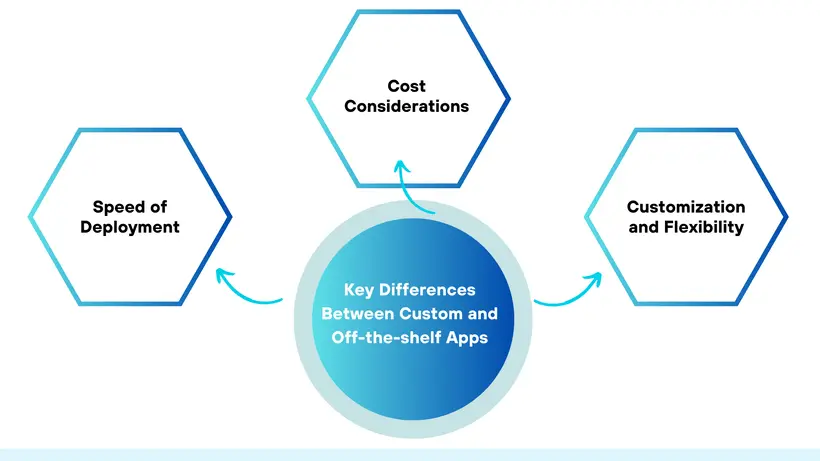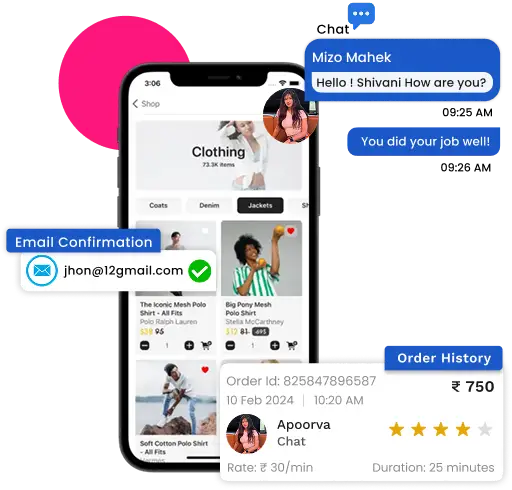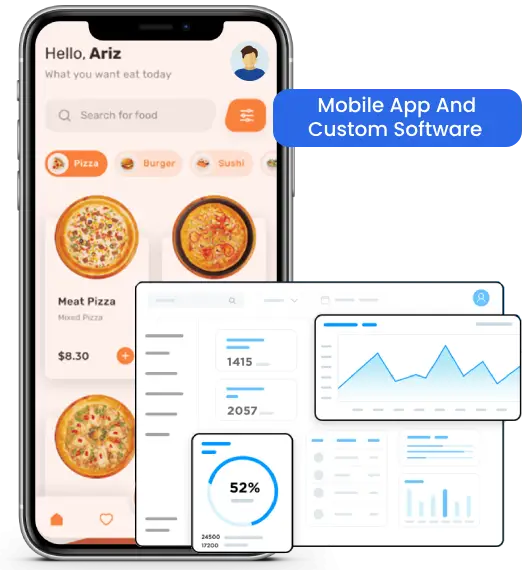Nowadays, businesses are increasingly relying on mobile applications to streamline processes, enhance customer engagement, and drive growth. When it comes to building an app for a business, two primary options are available: custom apps and off-the-shelf apps. These two approaches differ significantly in terms of development, cost, and functionality, each offering unique advantages and disadvantages depending on the specific needs of a business. The decision between choosing a custom app or an off-the-shelf solution can be a daunting one, as it affects the business’s budget, flexibility, and long-term goals. In this blog, we will explore custom vs off-the-shelf apps, shedding light on which solution might be the best choice for your business.
Understanding Custom Apps
Custom apps, also known as bespoke applications, are specifically developed to meet the unique requirements of a business or organization. These apps are built from scratch and are tailored to solve specific problems or provide particular functionalities that are important for the business. Custom applications are designed with the business’s specific goals in mind, and as such, they tend to be highly specialized and scalable.
The development process for custom apps typically involves a thorough analysis of the business’s needs, followed by the design, coding, and testing of the application. Since these apps are made for a specific business, they are generally more flexible in terms of functionality and can integrate seamlessly with existing systems and workflows.
Advantages of Custom Apps
- Scalability: As your business grows, custom apps can easily adapt and expand, allowing for additional features and user support without compromising performance.
- Competitive Edge: Custom apps offer exclusive features that can provide you with a unique advantage over competitors, making your processes more efficient and distinctive.
- Full Control: With a custom app, you have complete control over its features, updates, security, and integration, ensuring it aligns with your strategic goals.
- Tailored Fit: Custom apps are specifically designed to meet the unique needs and workflows of your business, ensuring a perfect fit for your operations.
Limitations of Custom Apps
- High Initial Costs: Developing a custom app requires significant upfront investment in time, resources, and expertise, making it a costly choice for many businesses.
- Long Development Time: Custom apps take time to develop, often spanning weeks or months, depending on complexity, which can delay the overall development of the app.
- Ongoing Maintenance: Once built, custom apps require regular maintenance, bug fixes, and updates, which can incur ongoing costs and require dedicated resources.
- Risk of Scope Creep: As the development process evolves, additional features and requirements can be introduced, leading to delays and unplanned budget increases.
Understanding Off-the-Shelf Apps
Off-the-shelf apps, on the other hand, are pre-built software solutions that are available for purchase and use by any business. These apps are developed to cater to general needs across a wide range of industries, and they come with a set of standard features and functionalities that can be used right away without requiring custom development. Off-the-shelf apps are typically available in the form of subscriptions, licenses, or one-time purchases.
These apps are mass-produced and often come with a user-friendly interface, making them easy to implement and use. They are designed to be versatile, providing general-purpose solutions to common business problems, such as project management, time tracking, customer support, and accounting. Many off-the-shelf apps also offer some level of customization, allowing businesses to adjust certain features to better suit their needs. However, the level of customization is often limited compared to a custom-built solution.
Benefits of Off-the-shelf App
- Cost-Effective: Off-the-shelf apps come at a significantly lower initial cost, as development expenses are spread across multiple users, making it affordable for small businesses.
- Proven Reliability: Off-the-shelf apps are tried and tested by numerous businesses, offering a stable solution with a lower risk of bugs or operational failures.
- Ongoing Support: These apps often come with regular updates and customer support, ensuring your software remains up-to-date and fully functional without additional effort on your part.
- Quick Deployment: These apps are ready for use immediately, allowing for fast implementation and minimal disruption to business operations.
Limitations of Off-the-shelf Apps
- Integration Issues: These apps may struggle to integrate smoothly with your existing systems or third-party tools, requiring additional customization or workarounds.
- Security Gaps: Since off-the-shelf apps are designed for mass use, they may lack the level of security customization needed for businesses dealing with sensitive or proprietary data.
- Excess Features: Off-the-shelf apps often include unnecessary features that may complicate usage for your team, requiring more training and adjustment time.
- Limited Customization: Off-the-shelf apps come with a fixed set of features, which may not fully meet your specific business requirements or processes.
Key Differences Between Custom and Off-the-shelf Apps
When deciding custom vs off-the-shelf apps, businesses need to evaluate several factors, including cost, time-to-market, customization needs, and scalability. The differences between the two types of apps are crucial when determining which one best aligns with the business’s objectives.

Cost Considerations
One of the most significant differences between custom and off-the-shelf apps is the cost. Off-the-shelf apps are typically much more affordable upfront. Since these apps are built to cater to a broad audience, the development costs are spread across many users, which lowers the price for individual businesses. Additionally, off-the-shelf apps often operate on a subscription basis, which can be more cost-effective for businesses with limited budgets.
Custom apps, however, are a more expensive investment. The development process involves building the app from scratch, which requires significant time and resources. Custom apps require the involvement of developers, designers, project managers, and testers, leading to higher development costs. Furthermore, ongoing maintenance, updates, and potential adjustments over time will add to the overall cost of a custom solution.
Speed of Deployment
Off-the-shelf apps have a clear advantage when it comes to speed of deployment. Since these apps are pre-built and ready for use, businesses can quickly implement them and start seeing results. The setup process usually involves configuring the app to suit the business’s basic needs, and the software is often designed to be user-friendly, requiring minimal training for employees.
In contrast, custom apps take longer to develop. The process involves detailed planning, design, development, and testing, all of which take time to complete. Depending on the complexity of the app, the development process can take several months or even longer. While this longer timeline allows for a more personalized solution, it also means that businesses will have to wait before they can start using the app.
Customization and Flexibility
Customization is one of the most important factors to consider when choosing between custom and off-the-shelf apps. Off-the-shelf apps are designed to serve a broad range of industries and users, which means that the level of customization available is often limited. While some off-the-shelf apps allow users to adjust settings, preferences, or workflows, the core functionality of the app remains the same for all users.
Custom apps, on the other hand, are built specifically to meet the unique needs of the business. This allows businesses to have complete control over the features, functionality, and design of the app. Custom apps can be fully tailored to integrate with existing systems and can include features that are not available in off-the-shelf apps. This level of customization is particularly important for businesses that have specific requirements or unique workflows that need to be addressed.
Custom vs Off-the-shelf Apps: Choosing the Right Solution?
The decision between custom vs off-the-shelf apps depends largely on your business’s specific needs, budget, and long-term goals. Off-the-shelf apps are often the right choice for businesses with general needs, limited budgets, or a desire for a quick, easy solution. They are cost-effective, fast to deploy, and come with built-in support, making them ideal for small businesses or startups that need to get up and running quickly.
On the other hand, custom apps are better suited for businesses with unique requirements that need a highly tailored solution. While custom apps require a larger upfront investment and more time to develop, they offer greater flexibility, scalability, and control. Businesses that anticipate growth or need specialized features will likely benefit from a custom app that can evolve alongside their operations.
In the end, the decision between custom and off-the-shelf apps comes down to your business’s unique situation. By carefully considering your needs, goals, and budget, you can make an informed decision that will help your business succeed in today’s digital world.
Final Thoughts
The choice between custom and off-the-shelf software depends on the nature of your business, budget, and long-term goals. Off-the-shelf applications are a great option for businesses with standard needs and a limited budget, while custom applications offer the flexibility and unique features that growing businesses or those with specialized requirements often need. If you’re interested in investing in custom mobile app development services, the Dreamer Technoland team is here to help you create a reliable platform. With over 9 years of experience, we’ve provided top-notch skills, talent, and proven strategies to deliver excellent software solutions to clients worldwide. Contact our sales team to get the benefits of bespoke software development.







